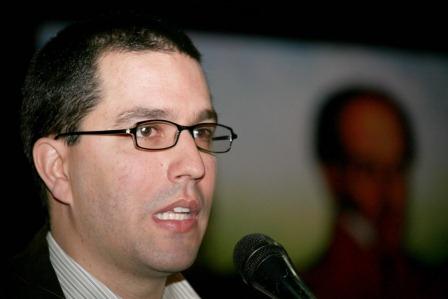CARACAS, (Reuters) – Venezuela’s government said today it foiled a plot to destabilize Sunday’s presidential election, the latest in a flurry of claims that the opposition has derided as crude attempts to distract voters from the country’s problems.
Vice President Jorge Arreaza went on national television to announce that security forces had captured two Colombians posing as Venezuelan military officials who were allegedly planning to disrupt this weekend’s vote, though he did not say how.
Flanked by the military’s top brass, Arreaza held up photos of the Colombian suspects. He also displayed about 50 assault rifle cartridges and explosives that he said were linked to a group of Salvadoran mercenaries previously accused by the Venezuelan government of plotting to kill acting President Nicolas Maduro, who is favored to win on Sunday.

“We’ve managed to dismantle a plan that would try to influence the election or the post-election period,” said Arreaza, a son-in-law of late president Hugo Chavez, whose death from cancer on March 5 triggered this weekend’s vote.
“This is wonderful news, because it means that we can all vote on Sunday in peace.”
The accusations are the latest twist in an election campaign marked by one dramatic claim after another. In March Maduro said U.S. officials were orchestrating a plot to kill opposition candidate Henrique Capriles as a way of sparking a coup, an accusation that Washington categorically denied.
Then came charges that the Salvadoran mercenaries were out to assassinate Maduro and sabotage the power grid to sow chaos.
The Capriles camp, for its part, warned of a government scheme to plant illegal arms and explosives on senior opposition figures in order to arrest them before the election.
Such finger-pointing has been a mainstay of Venezuelan politics since Chavez was first elected president in 1998 and began pushing ahead with a self-proclaimed “socialist revolution” that pit the government against the private sector.
Chavez’s 14 years in power thoroughly polarized Venezuela, an OPEC member that sits on the world’s largest oil reserves.
Chavez himself frequently said he was the target of assassination plots, which the opposition dismissed as a tactic to distract Venezuelans from daily problems such as rampant violent crime, high inflation and deteriorating infrastructure.
Maduro went so far as to suggest Chavez’s illness might have been caused by “imperialist” enemies in the United States.
The Capriles camp scoffed at the government’s latest claims.
“These kinds of actions are intended to plant fear, intimidate and keep Venezuelans away from voting booths,” Ramon Guillermo Aveledo, head of the opposition coalition, said at a news conference in Caracas on Friday.
“The Venezuelan people are savvy and know what they have to do,” he added.
GAP NARROWING?
Most polls have given Maduro a double-digit lead over Capriles during the campaign, but a few show the gap narrowing. A Datanalisis survey released by several banks on Thursday put the difference at 7 percentage points.
Still, most political analysts agree a Capriles upset remains a long shot, given the outpouring of grief among Venezuela’s poor following Chavez’s death and an aggressive pro-Maduro campaign on state TV that has painted the opposition candidate as a puppet of the rich.
A 50-year-old former bus driver who was one of Chavez’s closest confidants, Maduro has campaigned as a man of the people in the image of his former boss.
Chavez publicly endorsed him before dying, giving the acting president a huge advantage over Capriles.
Maduro also has benefited from the following that Chavez had among famous leftists, winning endorsements from the likes of Argentine soccer legend Diego Maradona.
“I’m with Maradona reminiscing with emotion about our friendship with the Supreme Leader,” Maduro wrote on his Twitter account on Friday before heading off with his guest to visit Chavez’s coffin in a military museum.
Capriles, an energetic state governor, has proven to be the opposition’s best candidate of the Chavez era, offering a plan that resembles Brazil’s model of mixing social welfare programs with business-friendly economic policies.
The 40-year-old generated widespread enthusiasm in his first bid for the presidency last October. But in the end he was no match for Chavez’s massive popularity among the poor.
“On Monday we’ll have a new Venezuela,” Capriles roared at his closing campaign rally late on Thursday. “It’s time for a new Venezuela, a democratic Venezuela where it’s OK to think differently.”
